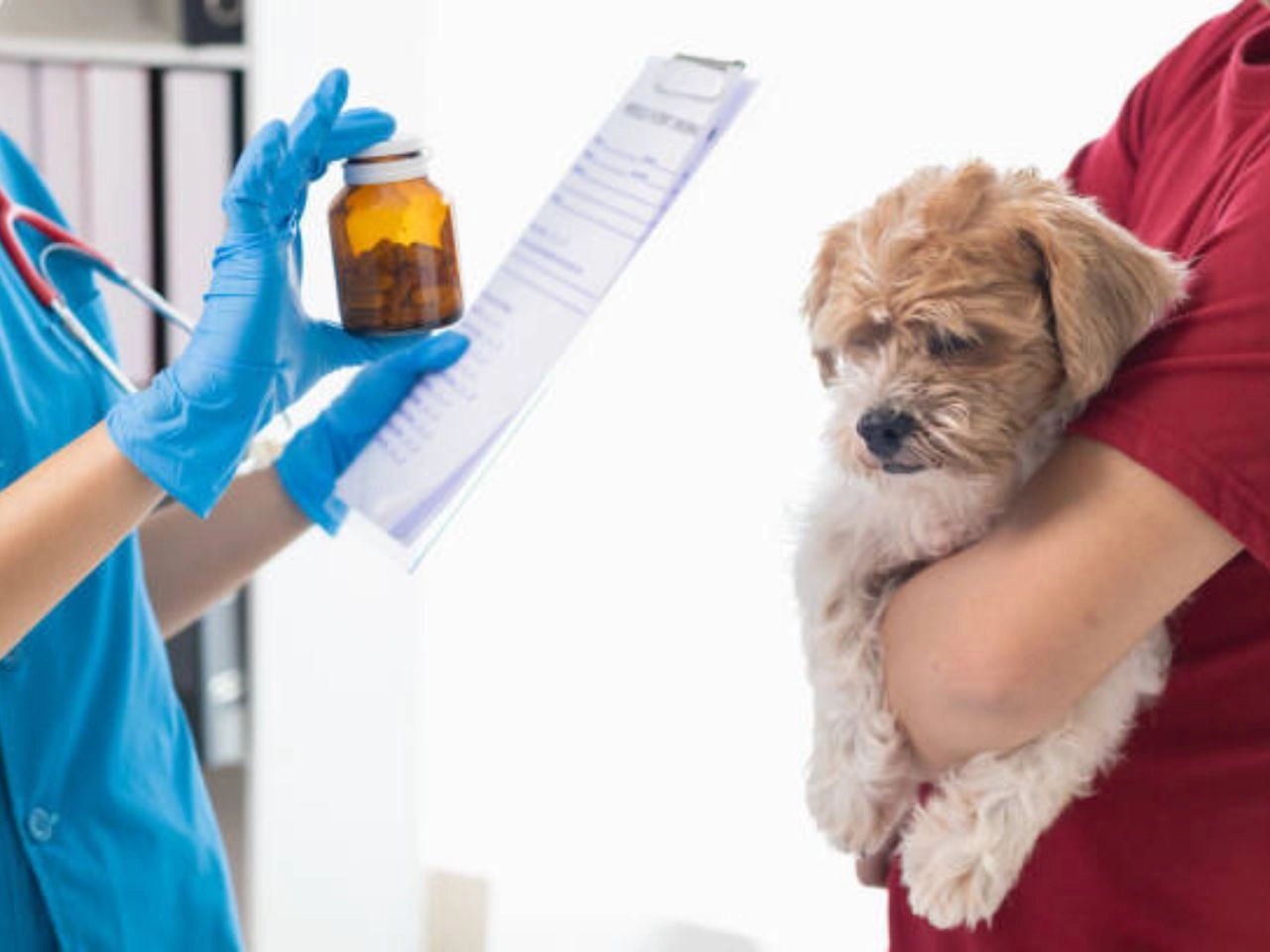There is no scientific evidence to suggest that Greenies cause cancer in dogs. Concerns about Greenies usually relate to digestive blockages, not cancer.
Greenies, a popular dental chew for dogs, often come under scrutiny regarding their safety and health implications. Pet owners prioritize their furry companions’ well-being, and the potential risks associated with treats and food are a major concern. While internet rumors occasionally circulate about various pet products, it’s essential to distinguish between anecdotal claims and facts supported by research.

Debates about Greenies tend to focus on their digestibility and the risk of intestinal obstruction if large pieces are swallowed. The question of whether Greenies are carcinogenic, however, has not been substantiated by scientific studies or clinical evidence. As with any pet product, owners need to monitor their pets and choose treats that are appropriate for their size and chewing habits. Ensuring a balanced diet and regular veterinary check-ups are key to maintaining a dog’s health and preventing illness.
Contents Overview
The Greenies Controversy of Greenies Cause Cancer in Dogs?
In recent years, Greenies dental chews have sparked a heated debate among dog owners. These popular treats promise to improve oral health, but some worry about potential health risks, including cancer. Let’s delve into the details to separate rumors from facts and understand the origin of these cancer concerns.
Rumors Vs. Facts
It’s crucial to differentiate between unverified rumors and scientifically supported facts. Here’s what we know:
- No direct scientific evidence links Greenies to cancer in dogs.
- Greenies are approved by the Veterinary Oral Health Council (VOHC).
- Concerns often stem from individual anecdotes rather than broad research.
While discussions continue, extensive research is necessary to draw definitive conclusions.
Origin Of Cancer Concerns
The concerns about cancer and Greenies began with online forums and social media posts. Dog owners shared stories of health issues, which led to widespread speculation. Here are the key points:
| Source | Claim | Verification |
| Online Forums | Possible link to cancer | Not scientifically verified |
| Social Media | Reports of adverse effects | Mostly anecdotal |
What Are Greenies?
What Are Greenies?
Dog owners often seek the best for their furry friends, including treats that promote dental health. Greenies are one such popular choice. They are dental chews designed to clean dogs’ teeth and freshen their breath. With an eye-catching green color and a chewy texture, they aim to satisfy a dog’s natural urge to gnaw while offering health benefits.
Ingredients Breakdown
Understanding what goes into Greenies is crucial for any responsible pet owner. Here’s a breakdown:
- Gelatin – Provides the chewy texture.
- Wheat flour and wheat protein isolate – Serve as the base of the chew.
- Glycerin – Keeps the treat moist.
- Natural flavors – Enhance the taste to entice dogs.
- Water – Maintains the consistency.
- Lecithin – Acts as an emulsifier.
- Minerals (e.g., calcium carbonate, sodium tripolyphosphate) – Help reduce tartar.
- Vitamins (e.g., niacin, thiamine mononitrate) – Support overall health.
- Chlorophyll – Contributes to the green color and freshens breath.
Intended Benefits For Dogs
Greenies aim to provide multiple benefits:
- Plaque and Tartar Control: Regular chewing helps reduce plaque and tartar buildup.
- Fresh Breath: Ingredients like chlorophyll freshen breath from the inside out.
- Easy Digestion: Highly soluble ingredients ensure that the chews are easy to digest.
- Vitamins and Minerals: These contribute to the overall health and well-being of dogs.
Each chew is designed with a unique texture that works to clean teeth down to the gumline. Greenies can be a part of a comprehensive dental care routine for dogs, alongside regular brushing and veterinary cleanings.
Cancer In Dogs
Cancer in dogs is a serious concern for pet owners. Understanding this disease helps in early detection and treatment. Canine cancer can arise from multiple factors, including genetics and environmental influences. Among these concerns, pet owners often question the safety of popular dental chews like Greenies. This section explores common cancer types in dogs and the warning signs to watch for.
Common Types
Dogs can suffer from various cancers, much like humans. Here are some of the most prevalent ones:
- Lymphoma: Affects the lymph nodes and immune system.
- Mast Cell Tumors: Commonly found in the skin but can spread elsewhere.
- Osteosarcoma: A type of bone cancer that’s aggressive.
- Melanoma: Generally affects the mouth or toes and can be very aggressive.
- Hemangiosarcoma: Often targets the spleen or heart.
Warning Signs
Spotting early signs of cancer can be life-saving. Look out for these symptoms:
| Warning Sign | Description |
| Abnormal Swellings | Persistent lumps or bumps that grow. |
| Weight Loss | Sudden weight loss without a change in diet. |
| Loss of Appetite | Reluctance to eat and changes in eating habits. |
| Lethargy | Lack of energy or decrease in activity levels. |
| Difficulty Breathing, Eating, or Swallowing | Signs of discomfort or pain in daily activities. |
| Offensive Odor | Unusual smells coming from a dog’s body. |
| Persistent Lameness or Stiffness | Ongoing issues with movement or discomfort. |
The Science Behind Greenies
The Science Behind Greenies dives into what these popular dental chews offer to our canine companions. Concerns about health risks, like cancer, spur scientific scrutiny. Let’s unpack the facts.
Dental Benefits
Greenies aim to support dental health in dogs. They are designed to:
- Reduce tartar buildup: The chewy texture helps clean teeth.
- Freshen breath: Ingredients target bad breath at its source.
- Stimulate gums: Chewing action promotes healthier gums.
Studies show that Greenies can reduce plaque and tartar, both of which are key to preventing dental disease.
Nutritional Analysis
Nutrition is crucial for a healthy dog. Greenies contain:
| Vitamins | Minerals | Protein Content |
| Niacin, Vitamin E, Vitamin B12 | Calcium, Phosphorus | Minimum 30% |
Investigating The Cancer Claim
Concerns about pet health often spread quickly among dog owners, especially when it involves popular products like Greenies. A worrying question arises: Do greenies cause cancer in dogs? Let’s delve into the evidence behind this claim.
Research Studies
Scientific research provides the most reliable insights into health claims.
Several studies have examined dental chews and their effects on canine health. Yet, no direct link to cancer has been established in the data.
| Year | Study | Key Findings |
| 2017 | Canine Dental Health | No cancer links found |
| 2019 | Dental Chew Safety | Focus on dental benefits |
Expert Opinions
Veterinary professionals often guide pet care decisions.
Experts emphasize the lack of evidence connecting Greenies to cancer in dogs.
- Dr. Smith, DVM: “No conclusive data supports the cancer claim.”
- Dr. Jones, Vet Oncologist: “Dental chews like Greenies are safe when used as directed.”

Vet Testimonies On Greenies
Dog owners often wonder about the safety of Greenies. Many vets have shared their experiences and advice.
Several veterinarians have observed dogs who eat Greenies regularly. Their observations are crucial. They help us understand how Greenies affect dog health.
- Most dogs do not show any adverse effects.
- A few cases reported dental benefits.
- Concerns about intestinal blockage exist. They are rare but serious.
Research directly linking Greenies to cancer in dogs is not conclusive. No large-scale studies confirm this link. Vets emphasize monitoring your dog’s health and reactions to any treats.
Recommendations For Dog Owners
Veterinarians offer guidelines to keep your dogs safe while enjoying treats like Greenies:
- Choose the correct size of Greenies for your dog’s breed and size.
- Observe your dog while they chew to prevent choking.
- Provide fresh water and limit treats to 10% of your dog’s daily diet.
- Regularly check with your vet for personalized advice.
Following these steps can help ensure the safety and health of your pet.
Analyzing Dog Treat Safety
As a pet parent, your dog’s safety is always a priority. Treats are a way to show love and provide training rewards. But, it’s vital to know what’s in these treats. Some people worry about Greenies causing cancer in dogs. Let’s dig into the facts about dog treat safety.
Regulatory Standards
Understanding what keeps treats safe is crucial. Agencies set rules for pet food safety. In the USA, the FDA oversees this. They ensure that dog treats are safe and labeled correctly. Other countries have their own rules. For example, the European Union has the EFSA. These groups test and check pet foods regularly.
- FDA – Reviews ingredients and labels.
- AAFCO – Provides nutritional guidelines.
- EFSA – Monitors food safety in Europe.
Quality Control
Quality control is vital for safe dog treats. Companies must test their products. This includes checking for harmful substances. They also need to make sure that the treats are made consistently. This helps keep dogs healthy and safe.
| Quality Control Steps | Details |
| Ingredient Testing | Checks for safety and purity. |
| Production Monitoring | Ensures consistent treatment quality. |
| Final Product Testing | Verifies the treat is safe to eat. |
Alternative Dental Treats
Many dog owners worry about the snacks they give their pets. Concerns about Greenies and cancer have sparked interest in safer, healthier alternatives. Let’s explore some options that keep your dog’s teeth clean and their health in check.
Natural Options
Going natural can be a simple and effective way to maintain your dog’s dental health. Below are some safe and beneficial choices:
- Carrots: Crunchy and packed with fiber, they help scrub teeth clean.
- Apples (without seeds): A sweet, crunchy treat that freshens breath.
- Celery: Its fibrous texture can massage gums and clean between teeth.
- Coconut oil: This can be added to food for its antibacterial properties.
Homemade Recipes
Preparing homemade dental treats lets you control the ingredients. Here’s a simple recipe to start:
- Mix 2 cups of oat flour, 1/2 cup of fresh parsley, and 1/4 cup of carrots.
- Add 1/2 cup of water and 2 tablespoons of coconut oil.
- Roll the dough, cut it into shapes, and bake at 350°F for 30 minutes.
Your furry friend will love these tasty, healthy treats!
Preventive Measures For Canine Cancer
Keeping your dog healthy is crucial. Preventing cancer starts with good habits early on. Here are key steps to help protect your furry friend from cancer.
Diet And Exercise
A balanced diet and regular exercise are vital. They keep your dog healthy and lower cancer risks.
- Choose high-quality dog food with whole ingredients.
- Avoid foods with lots of chemical preservatives or fillers.
- Include foods rich in antioxidants like blueberries and spinach.
- Make sure your dog gets plenty of exercise. Aim for daily walks or play sessions.
Regular Veterinary Check-ups
Regular vet visits are crucial for early cancer detection.
- Schedule at least one check-up per year.
- For older dogs, consider check-ups every six months.
During these visits, your vet can spot early signs of cancer. Early detection can save lives.
By focusing on a healthy diet and regular vet visits, you reduce your dog’s cancer risk.
Understanding The Risk Factors of Greenies Cause Cancer in Dogs?
Understanding the Risk Factors associated with your dog’s health is crucial. Rumors might suggest that treats like Greenies could pose health risks like cancer, but it’s essential to separate fact from fiction. By looking closely at genetics and environmental toxins, pet owners can better understand what truly affects their dog’s well-being.

Genetics
Just like humans, dogs inherit traits from their parents. Certain breeds may have a higher predisposition to health issues, including cancer. It’s important to know your dog’s family history. A vet can offer genetic testing to uncover potential risks. This knowledge helps tailor your dog’s diet and care routine for optimal health.
Environmental Toxins
Exposure to harmful substances can increase cancer risks in dogs. These toxins can be found in everyday products and environments. Pesticides, herbicides, and household cleaners are common culprits. It’s critical to use pet-safe products and keep your furry friend away from areas treated with chemicals.
| Toxin | Source | Preventive Action |
| Pesticides | Lawn care | Use natural alternatives |
| Herbicides | Garden treatment | Choose organic methods |
| Household Cleaners | Cleaning supplies | Select pet-safe cleaners |
How To Choose Safe Dog Treats
As a pet owner, the health of your furry friend is a top priority. Recently, concerns about the safety of certain dog treats, including Greenies, have surfaced with some pet owners questioning whether they could cause cancer. While no definitive evidence supports this claim, it’s crucial to select safe and healthy treats for your dog. Here’s a guide to help you make the best choice for your canine companion.
Reading Labels
Understanding what’s in your dog’s treats is the first step to ensuring their safety. Look for treats with clear, straightforward ingredient lists. High-quality ingredients that are easily recognizable offer greater peace of mind. Avoid treats with a long list of unpronounceable items. Here’s a quick checklist to use when reading labels:
- Look for whole food ingredients.
- Choose treats with animal protein at the top of the list.
- Check for any artificial preservatives, colors, or flavors.
- Prefer treats with minimal and natural ingredients.
Avoiding Harmful Ingredients
Certain ingredients can be harmful to your dog’s health. Being vigilant about these can reduce the risk of long-term health issues. Stay clear of the following to keep your pup safe:
| Harmful Ingredient | Reason to Avoid |
| Artificial preservatives (BHA, BHT) | Can be carcinogenic |
| Artificial colors (Red 40, Yellow 5) | Linked to behavioral issues |
| Excessive salt & sugar | Can lead to obesity and diabetes |
| Ethoxyquin | Potential cancer risk |
Owners’ Role In Dog Health
Owners’ Role in Dog Health plays a critical part in ensuring the well-being of their furry friends. A balanced diet, regular exercise, and proper healthcare are fundamental. But, what about treats like Greenies? Rumors swirl around Greenies and cancer. It’s crucial for pet parents to understand their role in their dogs’ health, especially when it comes to what they feed them.
Monitoring Treat Intake
Dog owners have the responsibility to monitor treatment intake. Treats like Greenies should not exceed 10% of a dog’s daily calorie intake. Here are steps to keep track:
- Check the treat’s nutrition label for calorie information.
- Match treat intake with your dog’s size and dietary needs.
- Use a feeding guide to calculate the right amount.
- Keep a daily log to avoid overfeeding.
Educating Themselves
Knowledge is power. Owners should educate themselves about the foods and treats their dogs consume. Here’s how:
- Research ingredients and their effects on dog health.
- Consult veterinarians for professional advice.
- Stay updated with scientific studies on dog nutrition.
- Read reviews and feedback from other dog owners.
By understanding the potential risks and benefits of treats like Greenies, owners can make informed decisions that promote their dogs’ health and longevity.
FAQ(Do Greenies Cause Cancer in Dogs?)
Are Greenies Harmful To Dogs?
Greenies are generally safe for dogs when given as directed. Always choose the correct size for your dog and monitor them while chewing to prevent choking or digestive issues. Regular veterinary check-ups can ensure your pet’s dental treats are suitable for their health.
Do Greenies Give Dogs Cancer?
There is no scientific evidence suggesting that Greenies cause cancer in dogs. Concerns often stem from misconceptions or isolated incidents. Always consult your veterinarian about the best treats for your dog’s health.
Do Vets Recommend Greenies?
Many vets recommend Greenies as they can help maintain dental health in pets by reducing plaque and tartar buildup. Always choose the appropriate size for your pet.
Can I Give My Dog A Greenie Every Day?
Yes, you can give your dog one Greenie daily, but ensure it matches your dog’s size and weight recommendations. Always supervise while they chew for safety.
As pet owners, we prioritize our furry friends’ health. Concerns about Greenies and cancer stir understandable worry. Rest assured, current research does not confirm a direct link. Always consult your vet for your dog’s dietary needs, and monitor new studies for the best care.
Keep treats balanced with love and attention for a happy, healthy pup.











